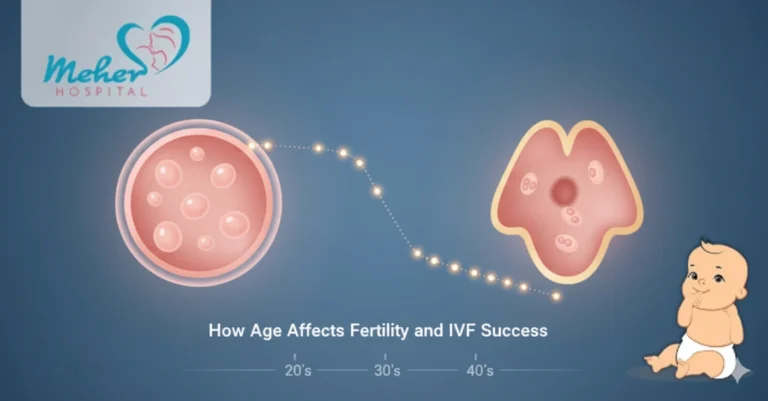In the case of having a family, many couples would be keen to know the influence of age on fertility. The fact is that age is a significant factor in natural conception and even in such an assisted procedure as IVF. When one has an idea of the influence of age on fertility, it may assist more people in planning pregnancies and making informed decisions regarding their fertility.
Although young females tend to be more successful, older age may lower the quality of eggs and the potential for fertility. It is due to this that understanding the effects of age on fertility and IVF outcomes is important to anyone planning to have a child or planning to have a child in the future. In this blog, you will get an idea of how age affects fertility and IVF success if you are planning to do so. Keep reading for more valuable insights ahead.
How can age affect fertility and IVF success? Find out in detail
Here are some of the points given below that will help you figure out how age affects fertility and IVF success. Have a look at them one by one.
1. Fertility Declines with Age
The quality and quantity of the eggs are natural and decrease with the age of the woman. This complicates conception as opposed to when one is younger. Knowledge of the influence of age on fertility will aid couples on how to be aware that age may slow down conception and how early planning can make conception easier.
2. Quality and Chromosomal Health of the Egg
The quality of eggs is one of the key issues to be worried about with old age. Eggs that are older tend to harbour chromosomal problems, and this can lead to miscarriages and unsuccessful IVF procedures. His healthy lifestyle choices could be a solution, but age is one of the determinants of reproductive success.
3. Male Fertility and Age
Although women are more likely to suffer more age-related fertility problems, men, too, are not immune. With age, there is a tendency for a reduction in sperm quality, which affects motility and DNA integrity. This is able to affect conception and even cause complications, risks to be higher risks. The ages of both partners are a contributing factor to natural and assisted fertility.
4. There is a decline in IVF Success with Age
IVF provides hope, but the success of such treatment is very age-specific. The outcomes are significantly better among women who are younger than 35 than they are among those who are older than 40. Clinics usually advise age-related diminishing egg quality as a reason to consider earlier treatment to be the best option, as embryo development and implantation success are directly related to age.
5. Raised Risk of Miscarriage
Ageing of the maternal age predisposes the occurrence of miscarriage, primarily because of chromosomal defects in the eggs. This may render the fertility process emotionally and physically difficult. Although genetic testing of IVF helps to minimise risks, young age has a robust influence that guarantees healthier pregnancies and positive outcomes.
6. Donor Eggs as an Option
In women with age-related fertility inhibition, donor eggs may considerably enhance the success of IVF. The donor eggs are taken from younger women, which guarantees a higher quality and an increased probability of implantation. This is the path taken by many couples who have tried other means but to no avail, and it is a testament that age does not have to prevent the parenthood dream.
7. Lifestyle Can Have an Impact
The influence of age, though significant, is not exclusive; lifestyle habits influence the fertility and the success of IVF. Reproductive health can be enhanced by eating a healthy diet, stress control, avoiding smoking and alcohol, and keeping a healthy weight. These changes cannot turn back the clock, but can be used to optimise the fertility potential at any age.
8. Male Age and IVF Success
Reduced IVF success rates can also be caused by older men. Sperm DNA fragmentation is also likely to be age-dependent and reduce fertility ability. This may have an impact on embryo quality and development. It is advantageous to couples that the age of both partners combines with their total chances of conceiving with the help of IVF.
9. Age has an Emotional Effect on Fertility
With fertility problems related to old age, the process is made even more emotionally difficult. When couples undergo repeated failures, the couple may be stressed out, anxious, or disappointed. Knowledge of the influence of age on fertility can equip a couple psychologically and make them seek immediate assistance, counselling, and medical support that can make the process less daunting.
10. Early Planning is important
Early planning is the most effective way to overcome fertility issues that are related to age. Preservation of fertility, such as the option of freezing eggs or sperm, gives flexibility to future procreation. Couples can effectively use the information about the impact of age on fertility and can make better choices, minimise risks, and increase the possibility of success in IVF or a natural pregnancy.
Sum up!
The explanation of the impact of age on fertility will help one make a wise decision when considering parenthood is concerned. Whereas younger couples have better opportunities in case of natural pregnancy and IVF, age can present some difficulties, such as a decline in the quality of eggs and sperm, increasing rates of miscarriage, and decreased treatment rates.
However, with modern medical advancements and expert care, these challenges can be effectively managed. Choosing Meher Hospital, the right IVF Fertility Center in Dehradun, can make a significant difference in your journey toward parenthood. Equipped with advanced technology and experienced specialists, a trusted IVF Treatment can guide you through every stage — from diagnosis to successful conception.
Also Read
IVF Success Rates: What You Need to Know Before Starting

